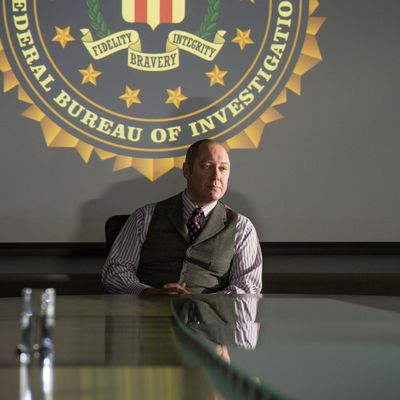
As Raymond “Red” Reddington, onetime super-spy turned international criminal at the center of The Blacklist, James Spader makes the same cliché entrance as a lot of mastermind characters these days: He strolls right into the lobby of FBI headquarters and surrenders. Why? Because he’s so brilliant, so powerful, so sneaky that not even being in police custody can stop him from doing whatever he wants.
What’s his agenda, you ask? Good question. Red doles out answers in tiny little pieces, as criminal masterminds tend to do — especially on TV dramas, where it’s foolish to give away your mysteries upfront. Red says he’s here to help the government foil an upcoming terrorist attack on the U.S., employing information he gleaned by being such a mysterious and all-powerful super-shady super-criminal, and that he refuses to communicate with anyone except for rookie profiler Elizabeth Keene (Megan Boone of Law & Order: L.A.). Why did this supremely self-interested lone wolf character suddenly decide to help the government? What’s the exact nature of his connection with Agent Keene? Does the fact that her dad left when she was a kid and Red left his family on Christmas Eve back in 1990 mean that we’ve got a Darth-and-Luke situation here? Could the series be that obvious? Surely not. So what’s it up to, really? All in due time, my pretties, all in due time. [Turns over hourglass, cackles, summons flying monkeys.]
The Blacklist is an exciting, deeply silly show. It plays a bit like Homeland with all the psychosexual kinkiness ironed out, leaving nothing but 24-style shadowy plotting, ticking-time-bomb scenarios, and nail-biting (if patently ludicrous) action. It’s the sort of show where you’re supposed to buy that Red could ask for and receive pampering in a five-star hotel (where, judging from the staff’s familiarity with his tastes, he’s already a regular) and then just slip out whenever he feels like it past the presumed legions of law enforcement types who surely must be guarding this James Bond–villain-level brainiac-troublemaker. It’s the sort of show where bin Laden–level terrorist masterminds and their henchmen can wander around Washington, D.C., before, during, and after exceptionally violent, exceptionally public incidents, without disguising their appearance, and not worry about getting flagged by cops or the NSA, or by anyone who watches cable news.
The Blacklist doesn’t trouble itself about any of this because it’s not set in reality, or in anything resembling reality, but in 24-land. The pilot’s showstopping action set piece on a bridge kills about a dozen people and destroys several vehicles with bullets and explosions and ends with gunmen escaping up a major river in a major American city in broad daylight, with nary a news chopper or even a gawking tourist to be seen. You can’t nitpick a show like this on plausibility grounds. It’s as much of a dark daydream as Hannibal — though, considering its generally light, Bond-like tone, I don’t think the pilot’s brutally graphic violence was necessary. Dream logic abounds, particularly in the show’s use of secret rooms and compartments (including a “black site” known as the Post Office) and in its clever obscuring of plot twists, which, in retrospect, you really should have seen coming. On this kind of show, two things hold the contraption together: the mood, and the lead actors’ charisma.
Fortunately, The Blacklist nails the mood right out of the gate (excited dread with a sprinkling of mordant humor), and it has a couple of winning leads in Spader and Boone. He’s as knowingly and delightfully hammy as you’d expect — as I’ve written elsewhere, part of what makes Spader such a fascinating performer is that in any given scene, he’s both the comedian and the straight man — and he’s well-matched by Boone, who sells the notion that Keene is green and easily flustered and overmatched by her job, then turns right around and startles you by holding her own against Red and the entire military-intelligence apparatus, barking orders and shooting terrorists and using ballpoint pens for tasks other than writing. If there were a contest for Best Odd Couple Pairing of the new season, I’d put Spader-Boone alongside Tom Mison and Nicole Beharie of Sleepy Hollow and call it a dead heat. The show’s biggest flaw is its eagerness to position virtually the entire supporting cast (including Homeland’s Diego Klattenhoff and 24 alumnus Harry Lennix) as stick-up-the-bum FBI guys who lecture Keene on proper procedure and serve as the butt of Red’s snide remarks. “I think I smell the stench of your cologne, Agent Cooper,” he tells Lennix’s character, whose name could be a nod to a certain FBI man on Twin Peaks. “It smells like hubris.”
This show smells like hubris, but that’s not a bad thing. It’s probably a mite too ridiculous for the dire tone it sometimes affects, but it’s confident, verging on brazen, and one tends to respect that quality in entertainment. If Red quit the international mastermind business and went to Hollywood, this is the sort of show he’d pitch, and if anyone questioned the believability of any part of it, he’d just grin cryptically and separate them from their money. Cash, of course.


